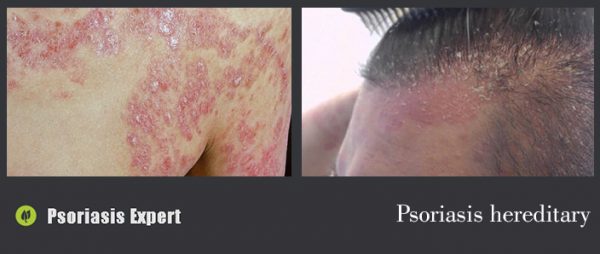Alphos, or psoriasis, refers to the class of severe chronic diseases having autoimmune nature. The peculiarity of psoriasis is in the fact that despite the many years of efforts of best scientists and doctors, the causes of the disease have not been clearly clarified. All the theories explaining its origin have not been scientifically proven and only reflect assumptions which are still not confirmed in practice.
Doctors claim that psoriasis is a hereditary disease, and the risk of developing it in a child whose parents suffered from it is very big.
Heredity of psoriasis has long been noticed in practice. According to medical statistics, more than 60% of all patients with psoriasis had other family members with the same disease. Scientists could also detect a certain group of genes in humans responsible for the violation of cellular mitosis. Various disorders in the body give impetus to the violation of cell division rate in the dermis which leads to the appearance of psoriatic plaques on the surface of body.
Considering all these facts, we can confidently state that psoriasis is an inherited disease.
However, we should note that psoriasis in parents is not a guarantee for the development of the disease in children. According to surveys, psoriasis in children, whose parents suffered from this disease, develops in 63% of cases. In addition, not in all cases their disease is caused precisely by genetic predisposition. Sometimes the causes are not innate but arise under the influence of many other factors.
Today, there are a large number of factors that can cause disease in absolutely healthy people. In patients whose relatives have previously suffered from psoriasis, the risk of pathology increases several times.
Factors leading to the development of psoriasis
Scientists identify several causes that can have a direct impact on the development of the disease. These are:
- long stay under the open sun in the warm season, excessive indoor tanning;
- stressful situations and excessive nervousness. In fact, the disease is often provoked not only by negative emotions, but also by shocks caused by positive experiences;
- regular injuries and friction of the skin;
- infectious and chronic diseases – for example, angina, otitis, sinusitis and others;
- the disease often occurs in patients with HIV infection;
- incorrect or too long use of certain medicines;
- hormonal disorders. This process can arise at such conditions as pregnancy, the period of menstruation, transient age, the diseases of the endocrine system;
- violation of lipid and other metabolic processes of the body.
Can psoriasis be inherited from father?
It is believed that if one of the parents has this disease, for example, the father, then the probability of skin lesions in a child reaches 25%. At the same time, some experts believe that it is not the disease itself which is inherited, but the features of the skin structure which may lead to psoriasis.
Is psoriasis inherited from mother?
According to the hereditary theory of psoriasis – a serious skin condition which is almost impossible to completely get rid of – the disease can be inherited from the mother. In this case, the probability of development of psoriasis in a child is around 25%. If both parents have been diagnosed with psoriasis, then the probability increases to 75%.
Psoriasis with proven heredity can be passed from generation to generation. However, we are talking only about possible risks. It is wrong to assert with full certainty that the child will definitely get the disease.
Long-term practice and medical statistics indicate the following pattern:
- The risk of psoriasis in children increases almost 4 times if one of the parents suffers from the disease.
- In cases where the pathology is diagnosed in mother and father at the same time, the risk is almost 75%.
Prevention
To protect the child from the disease, patient must adhere to certain rules of prevention.
- Try not to stay for a long time under the open sun. Excessive influence of ultraviolet radiation adversely affects the skin.
- It is necessary to timely seek help from a specialist in infectious and fungal diseases. Do not let the disease become chronic.
- Get rid of bad habits. It has been proved that taking alcohol, tobacco smoking and the use of drugs have the most negative effect on the body and can lead to an exacerbation of psoriasis.
- Do not allow the development of pathologies of the endocrine system.
- Another important rule is an adequate assessment of stressful situations. Try not to worry, and do not get irritated. Avoiding excessive emotional stress can help reduce the risk of developing the disease.
- One of the main rules of prevention is a healthy diet. Preference should be given to food rich in vitamins, minerals and trace elements. Give up fatty, fried, spicy, too acidic and salty foods. Pay attention to steamed food, cereals, sour-milk products, low-fat varieties of fish and meat.

